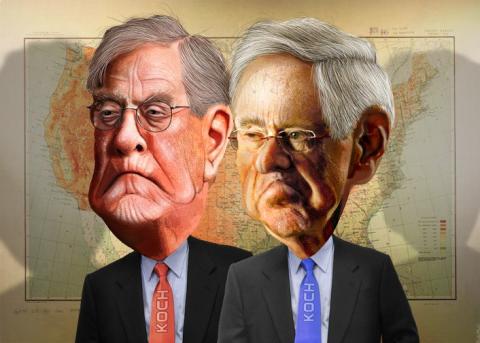The Koch brothers are the perennial capitalist power-donor bogeymen of the right, feared and maligned by Democrats as much as George Soros is hated by Republicans as the same kind of bogeyman of the left. However, as with many controversial matters, the Kochs aren't exactly what the partisan narrative portrays.
For instance, the Koch brothers and many of the publications they funded throughout the Bush years were staunchly anti-war, and they may even be more anti-war than the Center for American Progress. They also want to lower sentences for non-violent drug offenders, and support gay marriage and a woman's right to choose.
They also support some Democrats -- not nearly as many as they support Republicans, to be sure, but they're open to supporting more Democratic candidates for office, if they hear from any who speak their language.
This summer, Americans for Prosperity, a conservative / libertarian political advocacy group funded by the Koch network, said they'd be happy to back Democrats that support "pro growth" federal policies such as sound fiscal policies and deregulating the financial industry.
The group even launched an ad campaign this summer for a vulnerable Democratic senator from North Dakota going into the midterm elections in a state that voted for Donald Trump in 2016 – Sen. Heidi Heitkamp. The ad thanks her for her leadership role in working on the Regulatory Relief and Consumer Protection Act.
As for direct cash donations from Koch Industries to candidates, the FEC records on OpenSecrets.org show the Kochs are only directly financially supporting one Democrat's campaign for the 2018 midterms, down from the 13 Democrats who directly received Koch money for their campaigns in 2008. It's a name that frequently appears on the pages of Koch Industries donations throughout the years: Collin Peterson (D-MN).
Peterson is the most senior representative in Minnesota's U.S. congressional delegation, and has held his seat since 1991. He's a conservative Democrat from a highly rural, agricultural congressional district.
When Peterson was a member of Minnesota's state senate, he was actually a third party member of the Democratic Farmer Labor Party, a prominent minor party with roots in Minnesota. He's a fiscal conservative who supports tax cuts and the FairTax (a national sales tax plan to replace the income tax), so it's no wonder that Koch Industries likes him.
Although the Koch network has supported more Democrats in the past, the Koch brothers have made many overtures to Democrats in statements to donors this year, expressing a rather trans-partisan, independent ethos in July when Charles Koch told donors: "I don’t care what initials are in front or after somebody’s name — I’d like there to be many more politicians who would embrace and have the courage to run on a platform" that shares his values.
That was in response to a question about his thoughts on the House flipping to Democrats in the Fall.
Going into the midterms, immigration is also an important issue for the Kochs, who favor increased immigration and lower barriers to entry for migrant workers who want to live and work in America. This puts them at odds with President Donald Trump and aligns them with many Democrats, at least on immigration.
The LIBRE Initiative, the Hispanic outreach arm of the Koch network, has run ad campaigns to help several Democrats who are pushing for more liberal federal immigration policies.
As NPR reports:
"Democratic Reps. Ben Ray Luján and Michelle Lujan Grisham of New Mexico, as well as Democratic Reps. Raul Ruiz and Pete Aguilar of California will be the recipients of this political ad push, as will Sen. Chris Coons (D-Del). Luján is the chairman of House Democrats' campaign committee."
So, how many Democrats are the Kochs backing for office in November? Via direct political contributions from Koch Industries: 1. Via ad campaigns by one of the several arms of the sprawling "Kochtopus": a handful. And as the political winds continue to shift, the Kochs are not as committed to partisanship, or even to ideology as they are to ensuring the success and growth of their company, Koch Enterprises, the largest privately-held company in the United States -- an agenda they've been quite candid about in the past.
